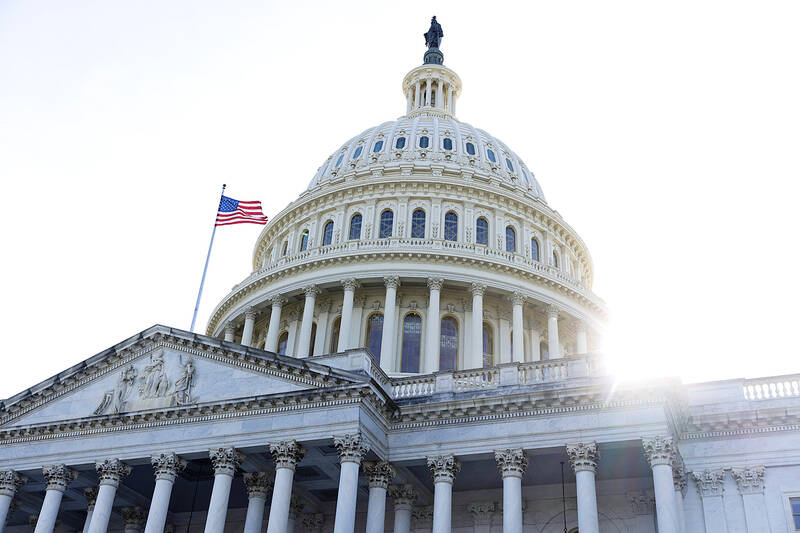US lawmakers on Thursday introduced new legislation to strengthen Taiwan-US defense cooperation to counter Beijing’s aggression.
US senators Jacky Rosen and Dan Sullivan, along with US representatives Michelle Steel and Steven Horsford, introduced the bipartisan and bicameral bill, transpacific allies investing in weapons to advance national (TAIWAN) security act, calling for stronger Taiwan-US defense cooperation “to counter China’s growing military expansion in the region,” Rosen’s office said in a statement.
The bill requires the US Secretary of Defense “to enhance defense industrial base cooperation” between Washington and Taipei to “deepen US-Taiwan defense ties, promote supply chain security and help alleviate Taiwan’s readiness challenges,” it said.

Photo: EPA-EFE
Under the bill, the US Department of Defense should submit a report to the US Congress on the feasibility and advisability of signing a defense industry cooperation agreement with Taiwan within 180 days of the act taking effect, Voice of America reported yesterday.
The bill requires the Pentagon to deliberate on several factors, including whether Taiwan is eligible to receive funds from the US department to join defense cooperation projects, and whether Taiwan is eligible to enter into a memorandum or other formal agreements with the US, it said.
In the face of Beijing’s rapid military buildup and aggression toward Taiwan, Rosen called on the US to “not only ensure our strength, but also bolster the strength of our democratic ally, Taiwan,” it said.
“It is no secret that communist China’s evil dictator, [Chinese President] Xi Jinping (習近平), is planning to invade Taiwan and continue his attacks against democracy in a quest for world domination,” said US Senator Rick Scott, who joined Rosen in introducing the bill.
The US should support its “peaceful and democratic ally Taiwan and its military” as the action would “send a strong message to communist China that America stands strong with Taiwan and will not bow to the will of an evil communist regime,” he added.
Other sponsors of the bill, including US senators Tim Kaine, Tammy Duckworth and Joni Ernst, described Taiwan as the US’ important partner in the Indo-Pacific region.
Horsford said that the bill, which is modeled on the cooperation between the US and India, “will bolster the Indo-Pacific’s stability in the face of growing military challenges from China.”
The US must show its “steadfast commitment to our allies, including Taiwan” to deter China’s expansion and protect democracy, Steel said.
The bill is to be reviewed and passed by the committees of both chambers, and if passed would be sent to the US Senate and the US House of Representatives to be voted on.
A day before the bill was introduced, vice president-elect Hsiao Bi-khim (蕭美琴) called for Taiwan’s inclusion in the US defense supply chain at the Hill and Valley Forum in Washington.
Rosen was one of the US lawmakers who introduced the Taiwan Cybersecurity Resiliency Act last year to authorize the US department to conduct cybersecurity exercises with Taiwan, and defend the nation’s military networks and infrastructure.
The act was incorporated into the National Defense Authorization Act for Fiscal Year 2024 and signed into law.

OPTIMISTIC: The DGBAS sharply upgraded its GDP growth estimate from 3.54 percent to 7.71 percent after the Taiwan-US trade agreement signing and given AI optimism The US imported more from Taiwan than China for the first time in decades, as US President Donald Trump’s tariffs reshape trade flows while a global boom in artificial intelligence (AI) fuels demand for tech products. US purchases of goods from China plunged almost 44 percent in December last year from 2024 to US$21.1 billion, US Department of Commerce data showed on Thursday. By contrast, shipments from Taiwan more than doubled during the same period to US$24.7 billion. The soaring Taiwanese shipments to the US reflect the huge expansion in supplies of chips and servers for AI companies, which has completely changed

NON-NEGOTIABLE: The US president’s action ran counter to one of the US’ ‘six assurances’ on not consulting China about arms sales to Taiwan, US lawmakers said US President Donald Trump’s admission that he is discussing arms sales to Taiwan with Chinese President Xi Jinping (習近平) is “alarming and a blatant violation of US policy and the six assurances,” US Representative Ro Khanna said on Tuesday. Trump on Monday said he would decide soon on whether to send more weapons to Taiwan, after Xi warned him not to do so. “I’m talking to him about it. We had a good conversation, and we’ll make a determination pretty soon,” Trump told reporters aboard Air Force One when asked about warnings raised by Beijing during a phone call with Xi over

The Central Election Commission has amended election and recall regulations to require elected office candidates to provide proof that they have no Chinese citizenship, a Cabinet report said. The commission on Oct. 29 last year revised the Measures for the Permission of Family-based Residence, Long-term Residence and Settlement of People from the Mainland Area in the Taiwan Area (大陸地區人民在台灣地區依親居留長期居留或定居許可辦法), the Executive Yuan said in a report it submitted to the legislature for review. The revision requires Chinese citizens applying for permanent residency to submit notarial documents showing that they have lost their Chinese household record and have renounced — or have never

US and Chinese fighter jets briefly faced off above waters near the Korean Peninsula this week, Yonhap News agency reported, marking a rare confrontation in that area between the two superpowers. About 10 US fighter jets on Wednesday departed an airbase in Pyeongtaek, South Korea, for drills above international waters off South Korea’s western coast, the news outlet cited unidentified military sources as saying. While the US planes did not enter China’s air defense identification zone, Beijing scrambled planes as they neared that region, the report said. “The Chinese People’s Liberation Army organized naval and air forces to monitor and effectively respond